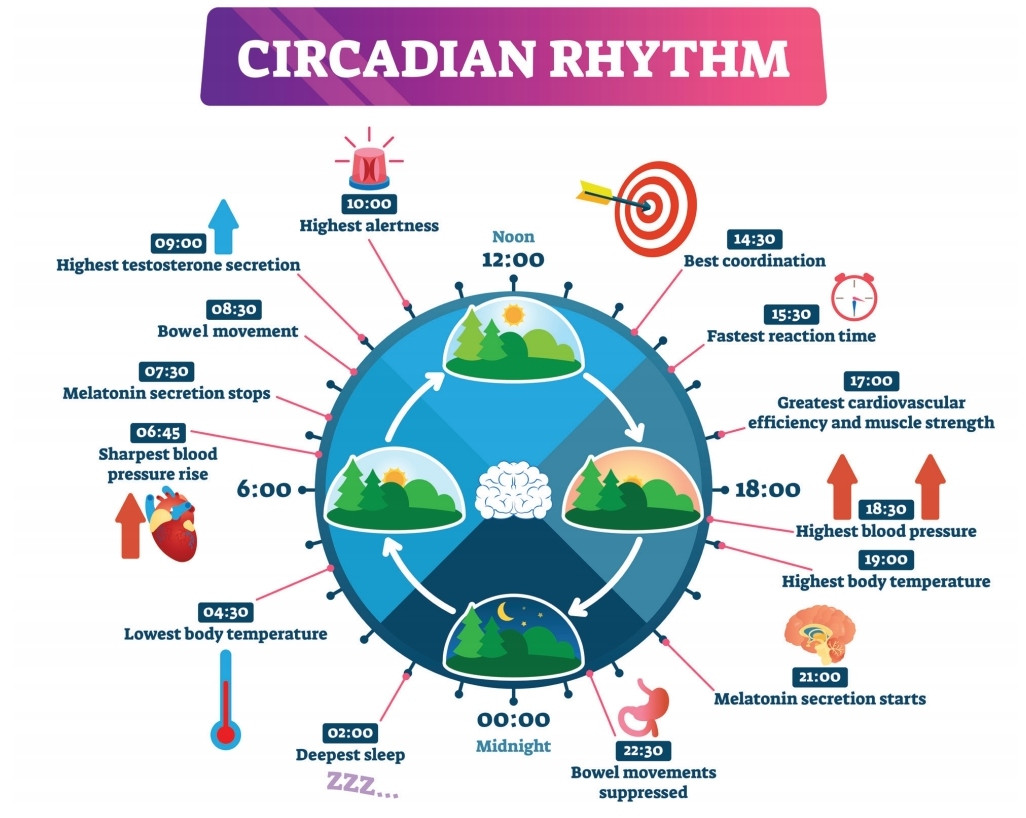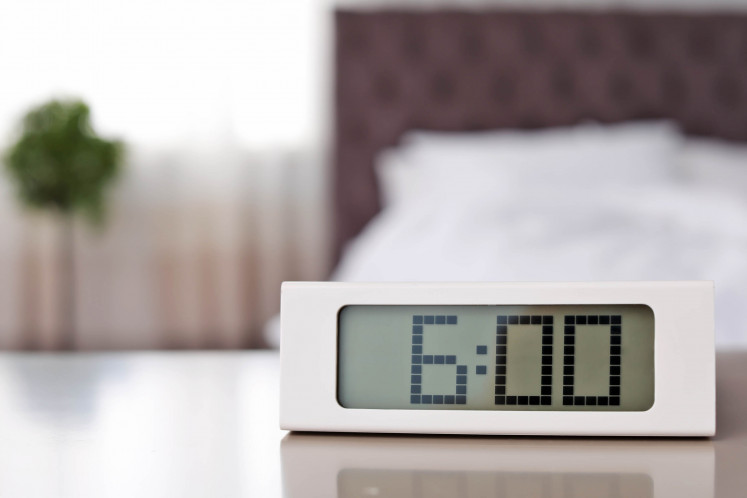Popular Reads
Top Results
Can't find what you're looking for?
View all search resultsPopular Reads
Top Results
Can't find what you're looking for?
View all search resultsMaintaining ideal weight: Eat, sleep in accordance with circadian rhythm
Apart from aligning our sleep with the circadian rhythm to keep our body weight in check, eating in accordance with the natural body clock can also help us maintain our ideal weight.
Change text size
Gift Premium Articles
to Anyone
A
s the COVID-19 pandemic forces millions to stay at home, hearing people grumble about gaining weight has become commonplace. Working from home has forced many to be confined to their desks at home, with limited space for the intense physical activities they usually do such as running, swimming or playing competitive sports. Not to mention that staying at home comes with great temptations for frequent snacking and living a sedentary lifestyle closely related to excessive screen time.
Raissa E. Djuanda, a clinical nutrition specialist, said at a live webinar titled “Maintaining ideal weight while staying at home” that those who spend too much time glued to TV, laptop or smartphone screens may not do enough physical activity or could become sleep deprived, and are hence at risk of gaining weight.
While we know that being physically inactive causes weight gain simply because the energy we consume from the food we eat is not burned off and turns into fat, we rarely blame lack of sleep as a cause of weight gain. But how does lack of sleep contribute to weight gain?
Lack of sleep is known to be the culprit behind slower metabolism as well as leading to decreased insulin sensitivity and higher blood glucose. (Shutterstock/New Africa)The US National Sleep Foundation states on its website that the link between sleep and weight is becoming clearer, although additional studies are still needed.
“Insufficient sleep is known to cause changes in hormones like ghrelin (which increases appetite) and leptin (which tells us we’re full),” wrote the Sleep Foundation. This is said to be the reason why sleep-deprived individuals are likely to feel hungry and consume more energy than those who have enough sleep.
Furthermore, the Sleep Foundation also pointed out how imaging studies suggest that when people are sleep deprived, their brains respond differently to unhealthy foods and they are more likely to eat them. In addition, lack of sleep is also known to be the culprit behind slower metabolism as well as leading to decreased insulin sensitivity and higher blood glucose.
Raissa identified sleep deprivation as a disruption to the circadian rhythm – a natural body clock that regulates the timing of periods of sleepiness and wakefulness throughout the day – and points out that maintaining an appropriate circadian rhythm is a key to keeping body weight in check.
According to the Sleep Foundation, the circadian rhythm dips and rises at different times of the day, so adults’ strongest sleep drive generally occurs between 2 to 4 a.m. and in the afternoon between 1 to 3 p.m., although there is some variation depending on whether you are a “morning person” or an “evening person”.
Adults generally need seven to nine hours of sleep, according to Healthline.com, and there are five stages of sleep during that time. The stages rotate between non-rapid eye movement (NREM) and rapid eye movement (REM) including drowsiness, light sleep, moderate to deep sleep, deepest sleep and dreaming.
Healthline also explained that sleep stages 1, 2 and REM consist of light sleep, while 3 and 4 comprise deep sleep, with stage 4 being the deepest sleep, typically occurring at 2 a.m. in accordance with the circadian rhythm. And during deep sleep – which accounts for 13 to 23 percent of the whole sleep duration – tissue growth and repair take place and important hormones are released.
Deep sleep is also the stage when blood sugar levels and metabolism balance out and the immune system is energized, continued Healthline.
So, if a person’s circadian rhythm is disrupted, for instance by traveling through different time zones, working night shifts or simply doing activities until too late at night, he or she could lose the optimal chance for bodily function restoration and, in the long run, become susceptible to obesity, which are risk factors for non-communicable diseases (NCD) such as cardiovascular disease, stroke, cancer, chronic respiratory diseases and diabetes.
Now that how sleep deprivation can be detrimental to health has been explained, Raissa advised that we avoid putting our smartphone or other gadgets such as laptops in the bedroom.
“The bedroom is a place to rest. If you want to sleep, you should turn off your smartphone or other gadgets,” she added.
It is, however, understood that people are logging more screen time during lockdown as they are working from home, and even children have to study online at home. To make up for the excessive screen time, “we must have adequate sleep, as well as follow a balanced diet and maintain physical activities,” Raissa advised.
Eat in accordance with circadian rhythm
Apart from aligning our sleep with the circadian rhythm to keep our body weight in check, eating in accordance with the natural body clock can also help us maintain our ideal weight.
Some of us might already be familiar with the circadian rhythm diet, or “eat with the sun” that basically promotes the idea that the timing of when we eat is as important as what we eat.
Eating in accordance with the natural body clock can also help us maintain our ideal weight. (Shutterstock/Natalya Stepowaya)“That’s because our metabolism changes throughout the day because of our circadian rhythm,” Michael Crupain, chief medical officer of digital health company Sharecare, told Today.com.
Crupain went on to say that the circadian rhythm expects us to eat during the day – hence “eat with the sun” – and fast during the night, and cited a study that found that calories consumed in the morning counted less than those consumed at night.
He then advised making breakfast and lunch the biggest meals of the day, with dinner being the smallest.
“Ideally, you should get about 75 percent of your nutrition before 3 p.m.,” said Crupain.
Science Daily also reported that a study funded by the Medical Research Council (MRC) and published in the journal Cell highlighted the importance of when we eat.
The data collected in the study suggests that eating at the wrong times could have a major impact on the circadian rhythm, although more studies are still needed. Eating in accordance with our natural body clock, therefore, is believed to help prevent obesity and subsequently the risk factors it presents.












